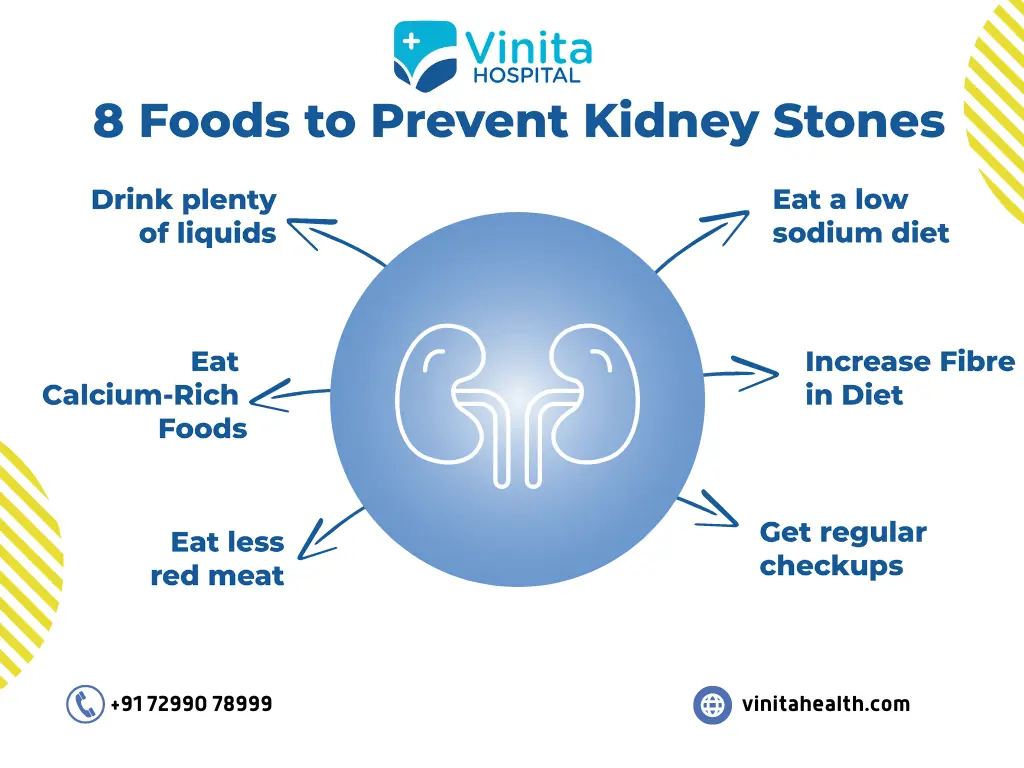A kidney stone is like a solid mass or crystal with an uneven shape that ranges from the size of a grain of sand to a golf ball. The patients who are prone to this, may not even be aware that they have a best food for kidney stone. Sometimes, even the little stones can be very painful as they pass through the urinary tract. This process might take up to three weeks and may be aided by drinking water.
A big kidney stone gets stuck in the ureter and can cause bleeding and prevent urine from leaving the body. Surgery is required if a stone does not pass on its own. To prevent this or to overcome surgery, a balanced diet including the best food for kidney stones along with a good amount of hydration is very essential.
What to Eat or Avoid to Prevent Kidney Stones?
If you have been affected by a kidney stone, your healthcare provider may recommend the best foods to avoid kidney stones to prevent them from coming back. Keeping that in mind, here are the eight dietary changes that may help anyone avoid kidney stones.
Water
Water is the first line of defence against kidney stones. Above all other best foods to avoid kidney stones, it is considered to be the most vital one. You should aim to drink 60 – 80 ounces of water on a daily basis. The more you hydrate your body with water, the more your urine flow should be clear, not orange, yellow, or brown.

Processed and High-Salt Foods
It is always better to limit or avoid processed or junk foods like crackers, chips, and frozen or pre-made meals while considering the good foods to prevent kidney stones. The other most important thing is to lower the sodium intake which means eating food with less salt. This simple habit may save you from painful conditions.
Animal Protein
Having too much animal protein like seafood, red meat, etc is also one of the reasons for kidney stones treatment. Include the best food for kidney stones by having a heart-healthy portion of protein, scattering them throughout the day instead of eating it all in one go. Animal protein boosts the uric acid level and reduces the citrate level. Interestingly, uric acid leads to the formation of kidney stones and citrate helps in stopping the stone formation.
Dairy Products
Include milk, yogurt, or cheese in your diet as these are good foods to prevent kidney stones. The calcium content in it helps to block other substances in the digestive tract causing stones. At the same time, avoid calcium supplements as they are not the best food for kidney stones and also, they can increase the risk of stones.
Fruits
Eat plenty of fruits as the best food for kidney stones because it has high water and fibre content. Also, it offers high levels of citrate and magnesium and is more alkaline – all of which play a major role to have a positive effect in preventing or fighting kidney stones.
Oxalate-Rich Foods
Veggies are a part of a heart-healthy diet and are foods good for kidney stones. But at the same time, they are also high in oxalates which is a naturally occurring compound linked to kidney stone formation. Take care while intaking green leafy vegetables, rhubarb, sweet potatoes, beets, legumes, grains, seeds, etc because they have a high level of oxalates.
Iced Tea, Sodas, and Chocolates
Drinking lots of iced tea, and dark colas should be avoided as they increase the risk of kidney stones. Pale sodas like ginger ale can be a better option but beware of the high sugar content. Also, check while eating almonds, soy milk, and chocolates because these are not foods good for kidney stones.
Calcium and Vitamin D
Getting too little calcium in your diet can also cause kidney stones because it can cause oxalate levels to increase. To prevent this, include more calcium and vitamin D in your diet as the best food for kidney stones. You can have cottage cheese, egg yolks, fatty fish, mushrooms, cheese, cereal, bread, and juices.
Dietary Guidelines for Best Food for Kidney Stone
You have to consume the best food for kidney stones besides following these important and helpful hints.
- Drink at least 12 glasses of water
- Consume citrus juices like lemon juice, orange juice, etc
- Eat calcium-rich and Vitamin D foods as they are the best food for kidney stones
- Minimize the intake of salt, added sugar, and animal protein
- Avoid foods and beverages that are high in oxalates and phosphates
- Avoid anything that causes dehydration like alcohol
Conclusion
To conclude, if you are prone to kidney stones, you have to consult with your doctor regarding the best food for kidney stones because he/she will run diagnostic tests, to determine what type of kidney stones you have and prescribe a specific diet plan for you to overcome the issue.
Read also Best Neurologist in Chennai





